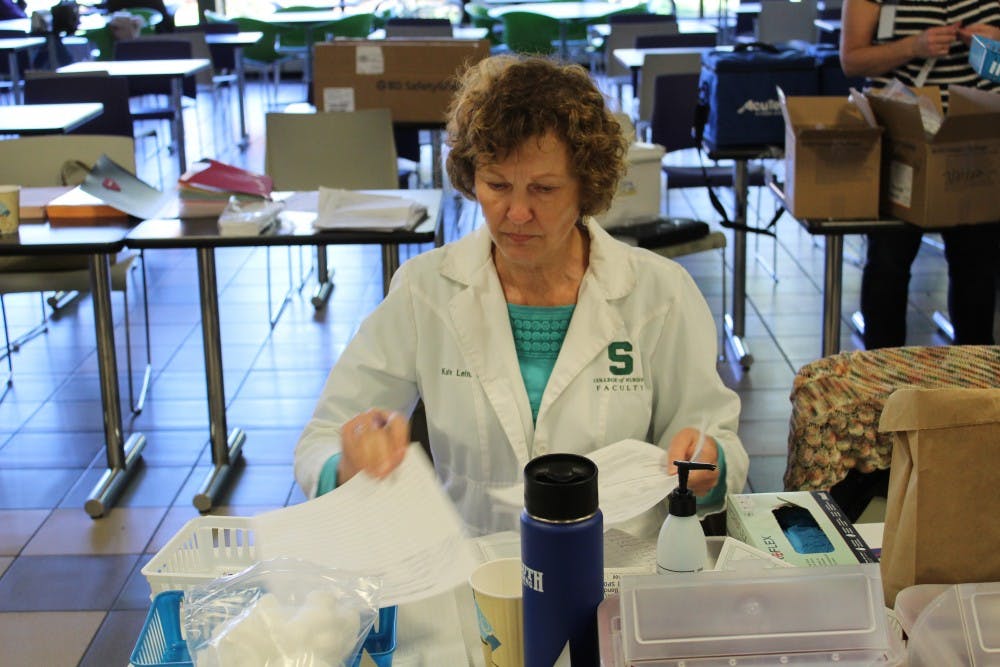Promising results for a COVID-19 vaccine emerged yesterday with biotechnology company Moderna announcing the conclusion of phase one trials on humans — but there's still a long way to go before any vaccine is readily available.
"I think the results are super encouraging," Shannon Manning, Michigan State epidemiology expert and associate professor of microbiology and molecular genetics, said. "They're seeing this protective, immune response, or at least that the antibodies that are being made by the individuals given the vaccine are able to prevent replication of the virus in tissue culture."
Moderna is the first company to find a safe, stimulated immune response, according a New York Times article by Denise Grady.
What makes the development important?
Moderna's findings are based on a preliminary trial, Grady said, where 45 healthy volunteers ages 18-55 from Seattle each received two doses of different levels 28 days apart.
The results determined that eight of the 45 participants produced neutralizing antibodies, or a level of physical response to the virus, according to a press release from Moderna.
"What's most encouraging is that these antibody levels that they were actually able to take out after vaccination were very similar to patients who had recovered from the actual infection," Manning said. "You would want those antibody levels to match."
Grady stated that the findings do not prove whether the vaccine works. Only larger, longer studies can determine this feat.
How does it work?
The technology that Moderna uses, called mRNA, is still an emerging platform. On their website, they emphasize that they are still early in the story. They also stated that they have previous coronavirus knowledge after having collaborated with the National Institute of Health, or NIH, on a vaccine for MERS, a different strain of coronavirus.
"It's important to note that this type of genetically engineered vaccine has not been used or licensed for use in humans yet," Manning said. "For the most part, it looks promising, but it might take a little bit longer to work out all of the different aspects and overcome all of the different challenges they might find."
National Geographic said in similarity that, "While public officials and news reports were quick to cite this as a record-breaking development, the biotechnology underlying this drug has existed for nearly 30 years, and it has never yielded a working vaccine for any human disease."
Manning said that, overall, vaccines are developed particularly for pathogens and agents that cause the highest frequencies and worst diseases that we've seen throughout history.
When most vaccines are created, Manning said, they take either the pathogen itself or a portion of the pathogen agent and directly add it to your system. This way, your body can produce the correct immune response to automatically protect you if you ever come in contact with the pathogen in nature.
Manning said that there are many pathogens, both bacterial and viral, that could cause high death rates if we didn't have vaccines.
What happens in phase two?
Moderna announced on May 7 that the Food and Drug Administration, or FDA, has cleared their application to proceed to a clinical trial (phase two) involving about 600 people.
The main goal of this second phase is to find out if the vaccine is continually safe and if the same positive results can be replicated on a larger portion of the population.
Manning said this could be done by monitoring who has adverse reactions or side effects and who doesn't.
"The really nice thing about this vaccine, compared to other vaccines, is that it's not a live virus," Manning said. "The vaccine is developed on the spike protein, which is really important for the disease process and the host in the human."
Support student media!
Please consider donating to The State News and help fund the future of journalism.
Manning said this means the virus won't be transmitted to other people during clinical trials, rather it's just in one person's system developing and mounting that immune response.
What's happens next?
"Another factor that would be really important to assess would be ensuring long-term protection and immunity," Manning said. "There have been some reports of people getting reinfected, so it's not really entirely clear yet how long immunity actually lasts within an individual and how variable that is across individuals."
Manning said this could develop into future situations where they need to figure out how many doses different people need or what the exact formulation of the spike protein in the vaccine is that they're using and how they need to adapt as the virus evolves.
Dr. Anthony Fauci, director of the National Institute of Allergy and Infectious Diseases, or NIAID, has previously suggested that it would still take 12 to 18 months for a vaccine to be widely available for public use. Moderna anticipates phase three trials to begin early this summer.
Discussion
Share and discuss “MSU epidemiologist explains COVID-19 vaccine trial results” on social media.








